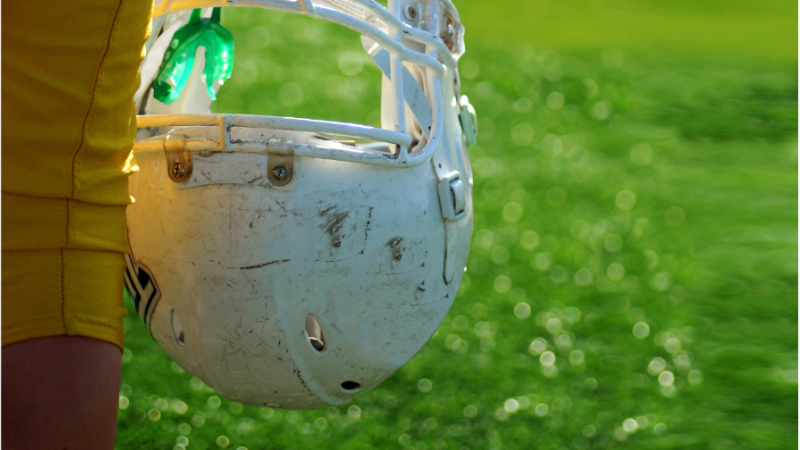- Most people recover from a concussion within days to weeks, but everybody is different and recovery might take longer for some.
- Most concussions do not involve loss of consciousness.
- Do NOT return to sports until cleared by a medical professional and you are able to tolerate school and exercise (non-contact) without experiencing any symptoms.
- Avoid doing anything that could cause another head injury, especially while you’re still recovering.

A concussion is a mild traumatic brain injury that results from a blow or jolt to the head, neck, face, or body. Although your skull protects your brain and something called cerebrospinal fluid, the sudden force of an impact can affect normal brain function. The most common symptoms include physical (e.g., headache), cognitive (e.g., feeling distracted or forgetful), emotional (e.g., feeling sad or anxious), vestibular (e.g., off balance) or sleep related difficulties. Typically, the brain has to work harder to do things (like thinking) that should be routine or automatic, and working too hard immediately after an injury can make symptoms worse. Just like you wouldn’t work out on an injured muscle or bone, it’s important to allow time for your brain to rest and recover.
How do people get concussions?
Concussions are very common, especially among sport and recreation related activities. You can also suffer a concussion from a fall, a car accident, a physical fight, a bike crash – any impact to the head, neck, face, or body that causes a sudden jolt or force to your brain.
If your head or another part of your body is hit hard enough, it can cause your head to move suddenly. Although your brain is protected by the skull and cushioned by something called cerebrospinal fluid, it can still shift around and hit the walls of your skull, which are made of hard bone. In addition, the nerves and fibers in the brain can be stretched or torn. This affects their ability to function properly and can result in concussion symptoms.
Does a person with a concussion always lose consciousness?
No. Most of the time people who have concussions do not lose consciousness (get knocked out). Many people believe that if they weren’t knocked out, they are fine, but that’s not true. Even if you don’t lose consciousness, you can still have a concussion. In fact, only ~10% of concussions involve loss of consciousness.
Symptoms
Most concussions do not involve a loss of consciousness (knocked out), but all (concussions) cause changes in brain functioning (or mental status) that are often seen in headaches, fatigue (extreme tiredness), or nausea (feeling like you need to throw up), and problems with balance and thinking.
The type of concussion symptoms and how long they last can be different from one person to the next, anyone who has a concussion needs time for their brain to heal. It’s not unusual to experience trouble with somatic/physical (headaches, fatigue), cognitive (attention, concentration, memory), regulatory abilities (behavioral control, angry outbursts), and/or mood functioning (sadness, depression, anxiety). Sleep can also be disrupted. These symptoms go away over time. However, if a person returns to pre-injury activity levels too quickly, they risk suffering another injury and it can take longer to recover. Getting more rest than usual, modifying daily routines, and managing expectations can all help facilitate recovery and minimize symptom severity.
What are symptoms of a concussion?
You may have had a concussion if you have any of following symptoms after an impact to the head, neck, or body:
- Blurry vision
- Memory loss – you’re unable to remember what happened before or after your head was injured
- Headache
- Feeling of pressure in the head
- Dizziness or off-balance
- Nausea with or without vomiting
- Trouble concentrating or making decisions even about simple things
- Feeling “foggy” or “out of it”
- Clumsiness – trouble with coordination and/or balance
- Feeling grouchy or anxious for no reason
- Feeling more tired or sleepy than usual
- Mood or behavior changes
- Sensitivity to light and/or noise
- Ringing in the ears
What should you do if you think you have a concussion?
If you think you might have a concussion, stop what you’re doing even if you feel fine. If you’re playing a sport, tell your coach right away. Always let your parent(s) or guardian(s) know what happened. Also, make sure to talk with your health care provider to find out if you should be checked or if you should go to the closest emergency room. In Massachusetts, the law requires that a qualified health care provider (HCP) clear any middle or high school athletes suspected of sustaining a concussion before resuming sports. Your health care provider will figure out if you’ll need a CT scan or other imaging (most times, no imaging is required) and when you can return to normal activities. Basically, “when in doubt, sit it out.”
What if you see someone else get hurt, and you think they may have a concussion?
If you watch someone fall, hit their head, or take a direct blow to the body that jolts their head, ask them if they are okay and find out if they remember what happened. If the person is alert, you could say that “the impact may have caused a concussion”; that they “may need medical attention” and offer to call their parent or guardian. If the person is unconscious and appears to be alone, you should tell an adult, call an ambulance, and make sure that they get medical attention right away.
Exam and Treatment
What is the exam like?
Depending on how severe your injury is, your health care provider (HCP) will usually perform a physical exam and ask many questions about how you are feeling. They may ask you a few seemingly simple questions such as “When is your birthday?”, “What is your middle name?”, or “What day is it?” These questions may seem silly but asking if you can remember simple things is a way of finding out if your brain has been affected. Your health care provider will look at your eyes and your ears, and check your reflexes, your blood pressure, and balance. If necessary, your HCP will do further testing such as a CT scan or an MRI to make sure you don’t have any bleeding inside of your head. You might also be referred to a neuropsychologist to evaluate your thinking abilities in greater detail.
What is the treatment for a concussion?
Treatment for a concussion is based on a number of things, including your age, overall health, and if you’ve ever had a concussion in the past. This is why an evaluation by a health care provider is needed.
General treatment for a concussion is about:
- Stopping the activity that caused the injury
- Stopping any other physical activity that could possibly cause more trauma to your head
- Physical rest
- Resting your brain – including modifying school work, texting, and computer time. Reducing cognitive activity is important initially, but full rest (laying in bed) for too long can actually slow recovery. So, there should be an effort to return to school once you feel well enough (typically after 1-2 days, but sometimes immediately and other times slightly longer).
Recovery and Prevention
When can I return to playing sports or other physical activities?
The general rule is that you won’t be able to return to any rough physical activity until your concussion symptoms are completely gone, including your ability to think clearly. Your health care provider (HCP) or a specialist will let you know. When you do get the okay to go back to playing sports or other physical activities, you should do it slowly. Remember, you haven’t been at the top of your game since your injury.
Many states have recently passed new laws that are meant to increase awareness of concussions, prevent multiple injuries, and provide parents, teachers, and schools with guidelines for managing concussions. For example: In the state of Massachusetts, all adults (coaches, parents) and athletes involved in high school sports or marching band must receive special training each year on how to tell if someone has a concussion and how to get help for a student who might have one. Most importantly, anyone who has symptoms of a concussion must stop playing whatever activity they were doing right away. Injured students will need to see their doctor or go to urgent care before returning to the activity and a written plan must be in place so that the student will return to physical activities and schoolwork slowly in order to promote a full recovery. Check the rules in your state that aim to lower the risk of long-term brain damage caused by concussion.
What if the concussion symptoms come back?
Tell your HCP right away if your concussion symptoms come back. They will tell you what to do if you experience more symptoms. For example, you may be given a prescription for medicine if you have headaches. Never take anyone else’s prescription medicine.
Get medical attention if you have any of these changes/symptoms and they don’t go away:
- A seizure
- Headaches, dizziness, vomiting, or sleep problems (can’t/won’t wake up)
- Changes in vision
- Slurred speech
- Others notice that there’s a change in your personality
- Or if you have a very long loss of consciousness (>1 minute)
How long will it take to heal completely after a concussion?
Most people recover from a concussion in 7-10 days, but others, particularly young children, may take longer. Everyone heals at different rates. People who have suffered a concussion in the past or have a learning disability, attention deficit disorder, anxiety, or depression can also take longer to recover from a concussion. If several months have passed and you’re still not better, some doctors call it post-concussion syndrome (“after” the concussion). This does not mean that your symptoms will never go away, only that it is taking you longer than usual to get back to your normal self.
Going back to school after a concussion: Helpful Advice
It’s a good idea to talk to tell your teachers/professors and school nurse that you’ve had a concussion. They can keep an eye on you and help with adjustments in your schedule (for a couple of weeks) until you recover.
You might ask your teacher to:
- Adjust your school schedule or have a shorter school day
- Allow rest periods or a break during classes
- Photocopy notes from the board or class lectures
- Lessen the amount of class work and homework
- Give you more time to finish assignments
- Take tests at a later time when you’re feeling better
How can you lessen the chance of a concussion?
Your risk of suffering a concussion partly depends on the type of activities you enjoy, but even if you don’t play contact sports or skateboard there are some things you can control. The following can help prevent any type of injury, including concussion.
- Wear a helmet (that fits well) when doing activities such as: biking, skateboarding, rollerblading, skiing, snowboarding, or playing contact sports.
- Buckle up and wear a seatbelt any time you are in a vehicle (and avoid all drugs and alcohol because they can affect your judgement.)
- Think before you participate in any activity that comes with big risks, especially to your head!
- Work on building neck and core strength
 Young Men's Health
Young Men's Health
